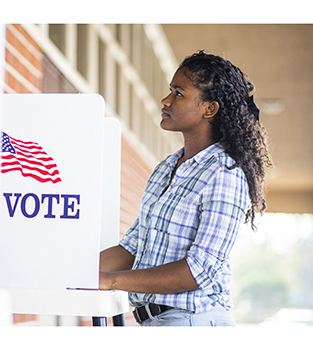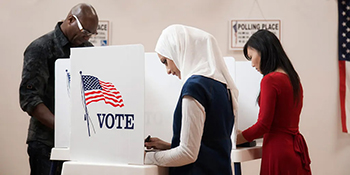From Our Archives
Debie Thomas, Walk in Love (2021); Debie Thomas (for All Saints Sunday), When Jesus Weeps (2018); Dan Clendenin (for All Saints Sunday), Saints and Sinners (2015); and Dan Clendenin (for Reformation Day), A Remarkable Exercise in Honest Thinking (2009).
This Week's Essay
"He brings princes to naught and reduces the rulers of this world to nothing." — Isaiah 40:23
For Sunday November 3, 2024
Lectionary Readings (Revised Common Lectionary, Year B)
Psalm 146 or Psalm 119:1–8
Hebrews 9:11–14
Mark 12:28–34
Last month my wife and I hiked the 83-mile Wicklow Way in Ireland, just south of the city of Dublin. On our very first day, a Canadian attorney told us that when he had learned there were two Americans on the trail, he got nervous. Were we crazy conservatives? Maybe "woke" liberals? What did we think of Trump and Harris? A few days later, an English farmer admitted that he was similarly apprehensive when he heard about "the Americans."
So, the world is watching and wondering as the United States elects a new president. Will we have an orderly process, a clear result, and a peaceful transition of power? Or will this election somehow provoke an inflection point in American democracy?
 |
I have already voted by mail, but I did so with little enthusiasm, deep ambivalence, and great apprehension. No matter who wins our presidential election, a full half of our population will be deeply aggrieved at losing, we will remain bitterly divided right down the middle, and all three branches of our government will struggle with dysfunction and legitimacy. Maybe things will get better, but they could also get worse, for no country is immune from the violent forces of history that have convulsed many great empires.
As Americans vote on November 5, the Spirit of God speaks to us through the Psalm for this week: "Do not put your trust in princes, in mere mortals, who cannot save. When their spirit departs, they return to the ground; on that very day their plans come to nothing." (Psalm 146:3–4). Despite our culture's propagandistic promises to the contrary, political power cannot save. In fact, there's exactly one place in Scripture where God laughs—when he scoffs at the pretensions of the powerful (Psalm 2:4).
When I voted by mail last week, I reminded myself of Daniel Berrigan's Credo. In many ways Berrigan was a political liberal, but he nonetheless didn't confuse his fidelity to the gospel with his engagement with politics.
I can only tell you what I believe; I believe:
I cannot be saved by foreign policies.
I cannot be saved by the sexual revolution.
I cannot be saved by the gross national product.
I cannot be saved by nuclear deterrents.
I cannot be saved by aldermen, priests, artists,
plumbers, city planners, social engineers,
nor by the Vatican,
nor by the World Buddhist Association,
nor by Hitler, nor by Joan of Arc,
nor by angels and archangels,
nor by powers and dominions,
I can be saved only by Jesus Christ.
Even so, I cannot be saved by Donald Trump, Kamala Harris, a Senate majority, or the Supreme Court. To think this way isn't defeatist, it's brutally realistic. And in an age when politics defines everything, it's also heretical.
After I mailed my ballot, and as we wait for the results of November 5, I have already pivoted to Walter Brueggemann's poem Post-Election Day.
You creator God
who has ordered us
in families and communities,
in clans and tribes,
in states and nations.You creator God
who enacts your governance
in ways overt and
in ways hidden.
You exercise your will for
peace and for justice and for freedom.We give you thanks for the peaceable order of
our nation and for the chance of choosing—
all the manipulative money notwithstanding.We pray now for new governance
that your will and purpose may prevail,
that our leaders may have a sense
of justice and goodness,
that we as citizens may care about the
public face of your purpose.We pray in the name of Jesus who was executed
by the authorities.
 |
With our many bitter divisions and dysfunctions, it would be easy to abandon politics altogether. But citizenship is both a privilege and a responsibility. We dare not abandon the public square and the greater civic good. Thank God for all those who've served our city councils, our school boards, and the like.
Our ultimate "citizenship" is in heaven, says the apostle Paul. Thus, our allegiance to God should be absolute and unconditional, whereas our allegiance to caesar will always be relative and conditional. Nonetheless, as citizens of the world, we care about what Brueggemann calls "the public face of God's purpose." Two readings this week suggest what that public purpose might entail.
"The Maker of heaven and earth," says Psalm 146, cares for the oppressed. He feeds the hungry, frees prisoners, and heals the blind. He lifts up those who are weighted down, he defends foreigners, protects the orphan, and sustains the widow. These eight categories of people identified by the psalmist face different challenges, but what makes them similar is that they are all vulnerable to forces beyond their control. A just society protects the weak and vulnerable.
In the book of Ruth for this week, three widows play a conspicuous role in the coming of God's kingdom here on earth—the Israelite Naomi who fled Israel to the enemy country of Moab in order to escape famine, and her two foreign daughters-in-law, Orpah and Ruth. That God cares for widows, and that we should too, are prominent themes throughout the Bible. The Greek word for "widow" occurs about twenty-five times in the New Testament.
The story of Ruth occurs during the time of the judges, perhaps the darkest period in Israel's history. Famine ravaged the land. Anarchy reigned, and “every person did what was right in his own eyes.” Whereas idolatry was rampant, "the word of the Lord was rare” (1 Samuel 3:1). On the moral level, it was a time of debauchery. Judges 19, for example, records the murder of a nameless woman who was gang raped all night and then dismembered, a crime so heinous that it provoked a civil war within Israel. "Think about it!" exclaims the narrator, "Consider it! Tell us what to do!" (Judges 19:30).
After ten years in Moab, and despite Naomi's protests, Ruth returned with her to Israel. In Bethlehem, Ruth was the foreigner from an enemy country. She was childless. She was widowed from a mixed marriage. But she vowed to cling to Naomi, her Hebrew people, and to their God. Ruth secured an economic livelihood for her mother-in-law by gleaning fields among the hired hands. She ingratiated herself to Boaz, the owner of the fields she gleaned. All Bethlehem knew this foreign widow as a “woman of excellence” (Ruth 3:11).
 |
Boaz was both a wealthy man and a near relative to Naomi's deceased husband Elimelech. As such, he not only had the means but also the obligation to “redeem” Ruth (and, in the process, Naomi). Another relative was even closer to Naomi than Boaz, but when he refused to redeem Ruth he cleared the way for Boaz. This second mixed marriage conceived a son, Obed, the grandfather of King David. Ruth's improbable story culminates when we meet her again on the very first page of the New Testament as a forebear of Christ Himself (Matthew 1:5).
To care for widows, and to protect those who are weak and vulnerable, are just one aspect of what Brueggemann calls the "public face of God's purpose." Proverbs 31:8–9 puts it this way: "Speak up for those who cannot speak for themselves, for the rights of all who are destitute. Speak up and judge fairly; defend the rights of the poor and needy." As we elect a new president, I'm praying for a society in which we all respect the dignity of every citizen, and in which every person is truly heard and fully represented.
And so this week in particular I have been praying the beautiful poem Crazy Quilt by Jane Wilson Joyce.
Weekly Prayer
From Jane Wilson Joyce, Quilt Pieces (Gnomon Press, second printing, 2009).
The Liberty Bell in Philadelphia
is cracked. California is splitting
off. There is no East or West, no rhyme,
no reason to it. We are scattered.
Dear Lord, lest we all be somewhere
else, patch this work. Quilt us
together, feather-stitching piece
by piece our tag-ends of living,
our individual scraps of love.Jane Wilson Joyce (PhD University of Texas, Austin) retired in 2012 as Luellen Professor Emerita of Classics at Centre College in Kentucky. A classical scholar with wide-ranging interests, Joyce regularly taught classes in Latin language and literature, ancient epic and lyric poetry, Greco-Roman drama, classical mythology, and creative writing. This poem comes from her book The Quilt Poems (1984).
Dan Clendenin: dan@journeywithjesus.net
Image credits: (1) Institute for Citizens and Scholars; (2) Pew Research Center; and (3) BBC News.





